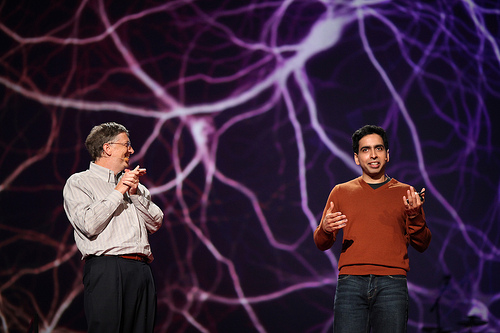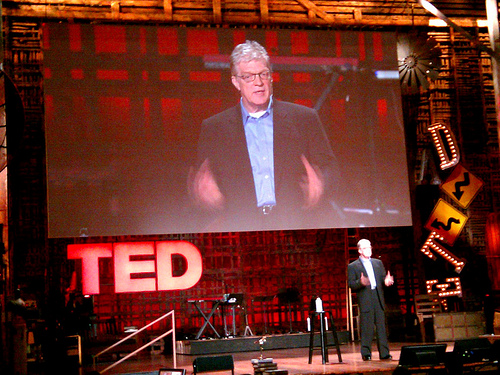
50 lectures that everyone should watch
If you start exploring the endless variety of TED talk topics, you'll find a communication bomb. In addition, the word pedagogue takes on many different forms within these conversations. It is for this reason that any teacher can draw from these lectures. Each of the speakers reveals their passion for a point of view on the world or a subject of study with the enthusiasm of a teacher who has only been teaching for the first year.
Using TED Talks to deliver an important message or ignite a spark of creativity can be far more effective in teaching than lesson plans alone or other preconceived notions of what needs to be said. TED talks further encourage educators around the world to think differently and encourage the same in their students. The following TED Talks are the best choice for any educator, as they make you laugh, warm your heart, break barriers, and always inspire you to dig a little deeper and push a little harder.
1. 100,000 lecturers
One student at Stanford University described this artificial intelligence course: "It's like sitting in a bar with a really smart friend who is explaining something you don't understand, but you'll soon understand." And Peter Norvig again like this: a class of one hundred thousand students shows exactly what it takes to create the best online education in all aspects; how it should work and how a person who studies in this way should feel.
2. School cloud
Sugata Mitra won the TED Prize 2013 for the following idea: " Let's build a school in the cloud ". After placing computers in the walls of poor areas of India, he proved that children and people in general are capable of learning both without a curriculum and even without a teacher. If the right tools are provided, they form groups and begin to learn together and with each other. The only teaching mechanism needed is encouragement and a positive kick.
3. Autistic brothers
Another must-see video for educators is Faith Jegede's lecture: What I Learned from My Autistic Brothers . Anyone who sees education as a one-way street will be enlightened. Faith Jegede shares her insights into the beauty hidden behind the autistic mind and encourages us to change our perspective on what is "normal".
4. Feedback for the teacher
In this TED Talk: Bill Gates: Teachers Need Real Feedback , Gates talks about the need to give teachers valuable feedback to improve, strengthen their skills, and become better. It takes the classroom into the realm of technology and cameras, using video to deliver and support better and more effective teaching.
Photo Credit: Paolo! via Compfight cc
5. Let's revolutionize learning!
In this witty and hilarious follow-up to his legendary 2006 lecture, Sir Ken Robinson makes the case for a radical shift from standardized schools to personalized learning. It means creating conditions in which children's natural talent can flourish.
6. Teaching design leading to change
Designer Emily Pilloton moved to rural Berie County, North Carolina to engage in a bold attempt to transform a community through design. In this video, he talks about teaching a design course called Studio H, which first stimulates the mind and body of high school students and second brings elegant design and new opportunities to the poorest region of the states.
7. What we learn from online education
Daphne Koller entices top universities to publish their most interesting courses online and for free. Not just as a service to society, but as research into how people learn. Working with Coursera (co-founded by Andrew Ng), every keystroke, quiz, peer-to-peer discussion, and self-assessed assignment leads to an unprecedented pool of data on how the learning process works. Watch the video here .
8. What teachers do
Have you ever heard the phrase "Who does not know, teaches?" At the Bowery Poetry Club, straw poet Taylor Mali pleads for that to change, delivering a powerful three-minute response on behalf of educators around the world.
9. How to learn? From mistakes
Diana Laufenberg, a senior history teacher at a Philadelphia high school, shares three surprising things she's learned about learning—including a key insight into learning with mistakes.
10. Changing educational paradigms
In this talk from RSA Animate, Sir Ken Robinson links three worrying trends: rising early school leaving rates, declining school interest in the arts and ADHD. An important and well-timed speech addressed to parents and teachers.
11. Don't eat that marshmallow!
In this short TED talk, Joachim de Posada shares a landmark experiment on delaying gratification and how it can predict future success. Included is one free video of kids trying their hardest not to eat a marshmallow.
12. The mystery of motivation
Career analyst Dan Pinkexplores the pieces of the puzzle that make up motivation. It begins with what every social scientist knows, but not a manager. Namely that traditional remuneration is not always as effective as we think. Listen to stories that shed light on the issue and you may find a way forward.
13. Let's teach children real math without the help of computers
Many of humanity's most exciting creations, from rockets to stock markets, are powered by mathematics. So why are children losing interest in it? Conrad Wolfram says that the part of mathematics that we teach, the hand calculations, is not boring, but it is even mostly irrelevant in real mathematics and the real world. In this lecture, he presents his radical idea of teaching children mathematics using programming.
14. Let's teach arts and sciences together
Mae Jemison is an astronaut, doctor, art collector and dancer. He tells stories from his own education and from his time in space, and urges educators to teach both arts and sciences together; both intuition and logic to help create bold thinkers.
15. Educational innovations in slums
Charles Leadbeater looked for radical new forms of education and found them in the slums of Rio and Kibera. In these places, some of the poorest children are finding revolutionary new ways to learn. And this new, informal, disruptive kind of school, he says , is what all schools must become.
16. Let's teach statistics before algebra!
Someone always asks a math teacher, "Will I be able to use algebra in real life?" And for most of us, says Arthus Benjamin, the answer is no. He therefore offers a bold proposal that would make math education essential in the digital age.
17. Mosquitoes, malaria and education
Bill Gates hopes a new kind of philanthropy will help solve some of the world's biggest problems. In an impassioned and, yes, funny eighteen-minute speech, he asks us to think about two big questions and how we might answer them.

Photo Credit: jurvetson via Compfight cc
18. Let's use video to renew education
Salman Khan talks about how and why he created the remarkable Khan Academy - a carefully structured series of video tutorials that offer instruction covering the entire math curriculum and now beyond. It shows the power of interactive exercises and asks teachers to consider flipping school scenarios. He advises them to give students the task of watching the lectures at home and "homework" to solve in the classroom with the teacher, who will be at hand if they need help.
19. How to educate leaders? Liberal arts schools will help
After leaving his job at Microsoft in Washington, Awuah returned to his home in Ghana and helped open a liberal arts college there. This polished speaker shares his experiences in Africa and uses them to highlight the importance of incorporating the liberal arts into education in order to nurture true leaders.
20. Revolution in education using open sources (open source)
Richard Baraniuk, a professor at Rice University in Houston, Texas and the founder of Connexions (an open source education system), talks about the benefits of open sources for educators. Baraniuk specifically talks about the disadvantages of textbooks and how using online open source information would provide more up-to-date and relevant material. Students interested in earning an online bachelor's degree in education might be particularly interested in this resource.
21. Sputnik Mania
Filmmaker David Hoffman shares part of his film Sputnik Mania. Through this documentary, Hoffman explains how the events of the film contributed to space exploration, the arms race, and the subsequent founding of an inspiring math and science education movement across the United States.
22. Searching for the next Einstein in Africa
Accepting his TED Prize, physicist Neil Turok shares his desire to provide opportunities for Africa's future by awakening and developing the creativity of the young people who live there. Turok uses his knowledge of math and science to understand why and how Africa was left to fend for itself and how we can change that.
23. What worries me, what excites me
Bill Joy talks about what's next. Looking ahead, the future co-founder of Sun Microsystems describes how the company and individuals have responded to various situations in the past. It then explores the path we can take to ensure positive growth in the areas of healthcare, education and technology.
24. Parable of Kenya
This Member of Parliament in Kenya talks about education - both his own and the importance of education for children in Africa. He has a vision of how this education could be realized, and he shares it with passion.
25. Toys-tiles that talk to each other
MIT graduate student David Merrill introduces Siftables - cookie-sized computer tiles that you can stack and randomly shuffle in your hands. With the help of these toys of the future, you will be able to learn math, play music or chat with friends. Could this be another thing from the field of education that can be tapped into?
26. The musical revolution of El Sistema
José Abreu on children transformed by music. Founder of the Venezuelan youth orchestra El Sistema, he talks about his desire to spread music throughout Venezuela and the world as a tool for social change and social empowerment. Abreu delivers his vision of the future of the world in Spanish (with English subtitles) with great passion.
27. The best youth orchestra of El Sistema
Gustavo Dudamel conducts the best youth orchestra in El Sistema. Watch Dudamel and his students perform Shostakovich's Symphony No. 10, second movement and Dance no. 2 Arturo Marquez. The power of this show is a testament to why El Sistema works.
28. Once upon a time there was a school
Eggers was surrounded by a culture of educators from an early age, and therefore grew up knowing the importance of education. He talks about his tutoring center Valencia 826 - how it has helped others and encouraged others to get involved in education as well. The power of this tutoring center is an inspiration to those who care about education.
29. Stories of creativity and play
Tim Brown explores the relationship between creative thinking and play and how this relationship can be nurtured. By demonstrating certain activities , he clarifies his thoughts . They are useful for everyone who works with children as well as for those who want to cultivate creativity in adults.
30. Dig up dinosaurs
Strange landscapes, heat and (sometimes) angry crocodiles await scientists looking for clues to the genius of evolution. Paleontologist Paul Sereno talks about his surprising encounters with prehistory - and a new way to help students join the adventure.
31. What we think we know
Jonathan Drori, an expert on culture and educational media, offers four questions to the audience. It serves as a starting point to explore how thoughts get into our heads and how difficult it is to shake them with those that are already there. Drori also highlights various "bad practices" that serve to reinforce faulty ideas and shows better ways to help students learn properly.
32. Strong thought about thoughts
Alan Kay shares a powerful thought about thoughts. Kay talks about ways to educate children using computers to clarify experiences. In doing so, he looks at simplicity and complexity, at traditional teaching modes that are based on complex ideas formulated by adults, and looks for methods of teaching students that could be simpler and more intuitive.
33. Play is more than just entertainment
Stuart Brown says the game is more than entertainment. It describes why playing is important and how it contributes to happy and healthy adults, not just children. Using examples from nature, Brown shows that play is an integral part of life and has the ability to change behavior.
34. One laptop per child
The founder of the MIT Media Lab in Massachusetts describes his program called "One laptop per child". This project aims to support education by making $100 worth of pedal-powered laptops and distributing them to children in developing countries around the world. Based on the premise that children are the most important natural resource of any state, Negropont's project wants to provide students with opportunities to create their own future as well as the future of their countries.
35. Freely accessible library
Brewster Kahle is building a truly massive digital library - of every book ever published, every movie ever released, every layer of web history... All free to the public - that is, unless someone else gets to it first. Watch the video here .
36. Institution vs. cooperation
In this insightful 2005 lecture, Clay Shirky shows how closed groups and societies are giving way to looser networks in which small contributors fill large roles and fluid collaboration replaces the rigidity of planning. His idea can equally be used for education.
37. Calling for the Reinvention of Liberal Arts Education
Liz Coleman is Bennington's Chair of Education and School Reform. She is an advocate of educational reforms. In this speech , he says that the interaction between the two organizations in the field of education should be seen as a hostile factor of the modern age, which confines fields of study to immobile, narrowly specialized places. It emphasizes the fact that solving big problems requires diversity.
38. How children are smarter thanks to games
Gabe Zichermann explains why games make kids smart. His speech completely rejects the idea that games and gaming devices are a complete waste of time for children. He says that games are the most innovative, creative and intellectual tools that can bring about improvement in almost every aspect of cognitive abilities.
39. Turning garbage into toys as a teaching tool
At the INK conference, Arvind Gupta shares simple yet amazing plans to turn trash into really fun and well-designed toys. Children make them themselves and learn the basic principles of science and design.
40. The girl who wanted to go to school
Kakenya Ntaiya made a deal with her father: if he would let her go to high school, she would undergo the traditional Maasai ritual of female circumcision. Ntaiya tells the story of her courageous continuation of college and working with village elders to build a school for girls in the local community. It is the educational journey of one single young lady that changed the fate of 125 other young women.
41. Teach only one child at a time
Educating the poor is more than a numbers game, says Shukla Bose. He tells the story of his pioneering foundation, Parikrma Humanity, which brings hope to India's slums. It looks at the dismal statistics of the past and focuses on caring for each child individually.
42. How to escape the Valley of Death in education
Sir Ken Robinson suggests three fundamental principles for the flourishing of the human mind - and how the current culture of education opposes them. In an entertaining and exciting lecture, he tells us how to get out of the educational "valley of death" we are currently facing and how to nurture our youngest generations to feel an atmosphere saturated with possibilities.
43. How schools kill creativity
In an entertaining and deeply moving way, Sir Ken Robinson shows how to create an educational system that encourages (rather than undermines) creativity. Check out this classic video here.
44. Life Lesson in Tinkering School
Gever Tulley uses eye-catching photos and footage to demonstrate the valuable experiences of the children who learn at his Tinkering School. If you give your young imagination the tools, materials and instructions, it will fly free and come up with creative solutions to problems by building unique ships, bridges and even roller coasters!
45. Mathematics classes need a makeover
Today's math curriculum teaches students to expect and excel at pre-made examples. By doing so, they are robbing children of a skill more important than problem-solving: formulating them. Dan Meyer presents proven classroom math exercises that challenge students to pause and think.
46. Children, take responsibility
Kiran Bir Sethi shows how their pioneering Riverside School in India teaches children the most valuable lesson in life: "I can." Watch their students take local matters into their own hands, lead other young people, and even educate their own parents.
47. Let's play to re-engage boys in learning
Although it may be inappropriate to make such bold generalizations, education statistics about boys aged 3-13 point to one thing: their involvement in school is not quite up to scratch. Their sense of violence, emotional detachment and hyperactivity indicate a tendency to drop out of school. Items that the male gender generally receives do not make them very great students. Anyway, there is hope. Alison Carr-Chellman shows how gaming, one of the most famous aspects of male culture, could help bring them back.
48. Let's lead children to business
Why is it that we generally look for a tutor for tutoring in order to teach a child what he is not good at? And why does the idea of becoming an entrepreneur sound so outrageous? Cameron Herold claims that we need to stop punishing children with these approaches with the help of business. It is necessary to support the development of children. Although the main message is specific in its focus, it can be grasped universally. Let's teach children what they are good at, not teach them to be mediocre at something they are not good at.
49. Three rules to shine in learning
Chemistry teacher Ramsey Musallam needed one life-threatening condition to wake up from ten years of "pseudo-learning" and understand the true role of an educator: to foster curiosity. In an entertaining personal account , Musallam lays out three rules for igniting the spark of imagination and learning and awakening students' enthusiasm for discovering how the world works.
50. Calling for learning
The incredibly eccentric Clifford Stoll ponders what it means to be drawn to learning, touching on topics like the synthesizer or vacuum bottles. She claims that the only people who can really predict the future are kindergarten teachers. They are the only ones that have the greatest effect on the next generation.
The article is translated from the Czech language from http://www.mimoskolu.cz/50-prednasek-ktere-by-si-mel-prohlednout-kazdy-vzdelavatel-vydani-2014/





